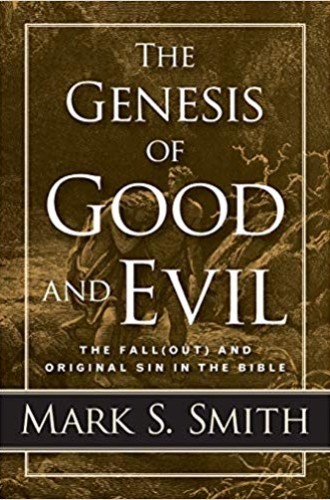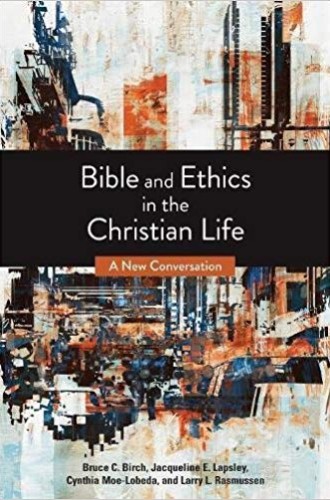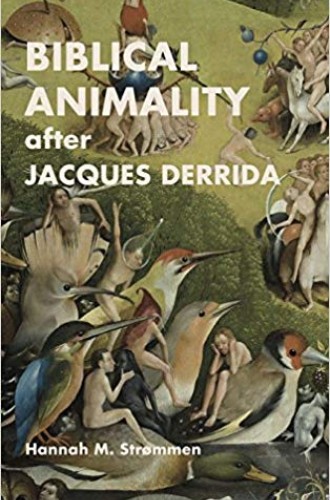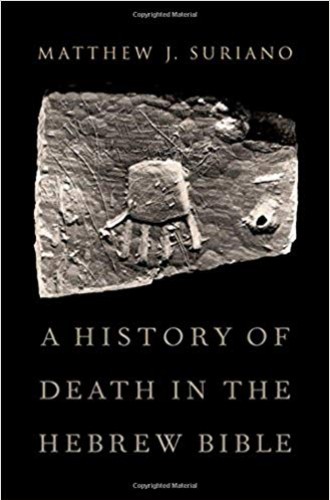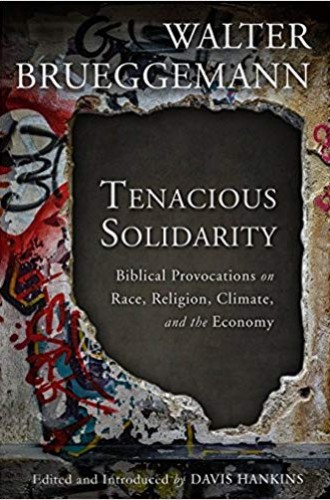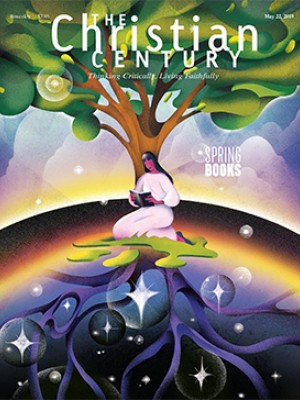Take & read: New books in Old Testament
Climate catastrophe, economic inequality, and the way we treat our dead
Biblical scholarship has traditionally been far more concerned with the text and its historical context than with how the Bible has been interpreted. In recent years, however, that tendency has been challenged by scholars who are thinking seriously about the history of interpretation. In The Genesis of Good and Evil: The Fall(out) and Original Sin in the Bible (Westminster John Knox), Mark S. Smith pursues questions about the text in its ancient context in a quest to find out what Genesis 3 “really says,” but he also takes seriously the readings of theologically invested interpreters who worked before the advent of critical biblical scholarship.
Smith begins with the claim common in Western churches that Genesis 3 is primarily about the Fall of humanity and original sin. He wonders how this story, which features no language of sin, evil, fallenness, or punishment, came to be the proof text for this doctrine. He concludes that Genesis 3 does not support the idea of humans as inherently sinful, although the fallout of the Adam and Eve story (which extends into Gen. 4 and 6) does introduce the possibility of human sin and evil.
Read our latest issue or browse back issues.
That said, sin and evil are not inevitable. The tree of knowledge of good and evil (Gen. 2:9) captures, metaphorically, two possibilities for humans: to be good or to be evil. Smith concludes that Western churches have failed to appreciate that the stories in Genesis 1–11 do not present humanity as utterly and universally fallen. Indeed, Abel (Gen. 4:4), Enoch (Gen. 5:22, 24), and Noah (Gen. 6:8) suggest that humans may “act with good, prior to and without any communication with God.”
While I am often charmed by the fact that biblical scholars can get obsessed with dusty bits of minutiae, grammatical and otherwise, my horror in the face of a looming climate-induced apocalypse leaves me with the uncomfortable feeling that we are fiddling while Rome burns. This is decidedly not the case with Bruce C. Birch, Jacqueline E. Lapsley, Cynthia Moe-Lobeda, and Larry L. Rasmussen in Bible and Ethics in the Christian Life: A New Conversation (Fortress).
They begin by directly addressing the challenges of reading the Bible and doing ethics in the Anthropocene, the geological era in which “natural systems are either embedded in human systems or profoundly affected by them.” Because of our outsized effect on the ecosphere, we are in a new age of human responsibility. We are just catching up to the idea that our moral universe needs to expand radically to respond to the needs of the ecosphere. As if that weren’t enough to wrap our heads around, while our planet has been changing, Christianity has also been changing—and almost as rapidly.
On the map of this new world, the authors pose questions and posit possibilities. In particular, they show how the Bible is already proving to be a powerful imaginative and grounding resource for fresh thinking about the environment. Writers as diverse as Wendell Berry, Bill McKibben, and Pope Francis can draw on the Hebrew Bible because the canon makes clear that the Israelite scope of moral responsibility extends not only to the human community but also to the land. Always ready with an example or an exemplar, the authors imagine how Christians—formed by and in conversation with scripture—might establish a healthier relationship with the planet and with one another.
Another study that addresses questions raised by the Anthropocene is Hannah M. Strømmen’s Biblical Animality after Jacques Derrida (SBL Press). Strømmen, a biblical scholar who engages the newly established field of animal studies, wonders if the Hebrew Bible is, in part, responsible for our problematic relationship to animals, which is characterized not only by mass extinctions of wild animals but also by the hyperindustrialized, cruel treatment, use, and slaughter of domesticated animals for human consumption.
After examining several crucial texts, her response is “sort of.” On the one hand, the Bible describes humans and animals as “finite fellow creatures under God,” and on the other, it depicts animals as objects to be mastered by humans. For example, Genesis 9 (the origin story of the first carnivorous man) provides license for humans to enact power and sovereignty over animals (Gen. 9:2). At the same time, the permission to eat animals (Gen. 9:3) appears in the context of God’s covenant with human and nonhuman life (Gen. 9:9–11). Strømmen concludes that the Bible does reflect an assumption of human superiority but that it also contains possibilities for seeing animals in a way that is radically humane. This vision has promising implications for all species, Homo sapiens included.
When I’m teaching Introduction to the Hebrew Bible, I sometimes become aware of a sense of loss among my students, an amorphous sadness that as moderns we have given up something precious—a connection to the earth, to each other, to the divine. Although no one wants to go back to public stonings, premodern medicine, or explicitly sanctioned male domination, on some fronts the Hebrew Bible offers us a much-needed corrective.
One such front is our thinking about death. In fact, it could be argued that the writers of the Hebrew Bible had a healthier understanding of death than we death-avoiding and death-defying moderns do. Although scholars once assumed that there was no such thing as a meaningful afterlife in the Hebrew Bible (i.e., no heaven, no transmigration of the soul to an otherworldly destination), recent scholarship has begun to challenge this academic orthodoxy. Matthew J. Suriano’s book, A History of Death in the Hebrew Bible (Oxford University Press), is a fascinating contribution to the new conversation about death and the afterlife.
Suriano argues that the family tomb represents not a failure of imagination but a rich afterlife ideal. He further posits that in the Hebrew Bible death does not occur at the moment a person stops breathing. Rather, the process of dying continues until the corpse is reduced to bones. During the time of its decomposition, the family cares for the deceased body (the “defunct soul”) by bringing provisions of food, drink, and light to the tomb, where the body lies supine on a bench, and by engaging in mourning practices and rituals. Once the body has decomposed, a second stage of the transition begins in which the family collects the dead person’s bones and places them into a collective repository. At this point, the person joins the postmortem community of ancestors, whose bones comingle and whose influence lives on through the memories of their descendants.
Because the family (rather than a cadre of professionals) attends to the body and supports the transition from death to afterlife, the process of dying is radically relational in the Hebrew Bible. What’s striking about Suriano’s presentation is the contrast with our contemporary death practices: here we have a world in which the living care for, commune with, and interact with the dead in an ongoing dynamic. In this iteration, death does not have the stark finality that it has in the modern West.
As is consistently the case with Walter Brueggemann’s writing, Tenacious Solidarity: Biblical Provocations on Race, Religion, Climate, and the Economy (Fortress)—a collection of essays based on lectures he gave between 2014 and 2018—manages to balance accessibility, thoughtfulness, relevance, and awe-inspiring boldness. He shows that in the Bible we find not a unified call for justice and equality or a perfectly consistent stream of critique of those in power but rather a record of struggles that resonate with our own. On one side are the rapacious haves, “the takers,” those who have the resources and the bureaucratic support to extract power, money, and status from a system that has thrown the beleaguered have-nots under the bus. On the other side, there are those who don’t entirely approve of these practices but are too numb and have too much to lose to do much about it.
In Brueggemann’s hands, the stories in the Hebrew Bible reveal a contest between the purveyors of consumerism—who, armed with a totalizing, life-sucking techne, play on our baser propensities to be greedy and fearful—and the church. The church is the underdog to be sure, but it is also a body that could mount a serious challenge if it were to fearlessly embrace the radical gospel embodied by the likes of Elijah, Elisha, the lament psalmists, Jeremiah, and Job.
All of these diverse books leave me hopeful about the future of biblical studies. Scholars are interpreting the Bible in light of serious challenges, asking the text burning questions that emerge from our current context. Does the Bible speak to the climate catastrophe we are hurtling toward? Does it speak to urgent matters of ethics and economic inequalities? Does it continue to speak in a relevant way about that most pressing of all human concerns, death? These authors make a compelling case that it does.
Read Jason Micheli's Take & read: New books in theology and Jonathan Tran's Take & read: New books in ethics.


